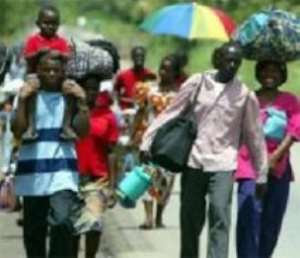
One African country that has been in the news for some time now is La Cote d'Ivoire which is commonly known in English as Ivory Coast.
It is a country in West Africa on the Gulf of Guinea. Its neighbours are Liberia, Guinea, Mali, Burkina Faso and Ghana.
The country's population is estimated at 20,617,068.
The nation's economy is one of the most developed in sub-Saharan Africa. It is the world's largest exporter of cocoa and one of the largest exporters of coffee.
Cote d'Ivoire became independent on August 7, 1960. From 1960 to 1993, the country was led by Felix Houphout-Boigny.
From independence until his death in 1993, Felix Houphout-Boigny was the president.
During the latter part of President Houphout-Boigny’s rule, there were a lot of protests by students, farmers and professionals which forced him to legalise opposition parties and hold the first contested presidential election in October 1990, which he won by 81 per cent.
In September 1998, thousands of demonstrators protested a constitutional rewriting that granted the then President, Henri Konan Bedie a lot of powers. Bedie also promoted the concept of Ivoirite, which, roughly translated, means “pure Ivoirian pride.” Although its defenders describe ivoirite as a term of positive national pride, it led to dangerous xenophobia (hatred of foreigners), with numerous ethnic groups like the Malians and Burkinabes driven out of the country in 1999.
President Bedie was overthrown in the country's first military coup d’etat in December 1999 and Gen Robert Guei assumed control of Cote d’Ivoire.
Although most of the fighting ended by late 2004, the country remained split in two, with the north controlled by the New Forces (FN). A new presidential election was expected to be held in October 2005, and an agreement was reached among the rival parties in March 2007 to hold the elections but it continued to be postponed until November of 2010 due to delays in its preparation.
Elections were finally held in 2010. The first round of elections were held peacefully, and widely hailed as free and fair. Run offs were held on November 28, 2010, after being delayed one week from the original date of November 21, 2010. Laurent Gbagbo who was then the President ran against former Prime Minister, Mr Alassane Ouattara.
On December 2, 2010, the Electoral Commission declared that Ouattara had won the election by a margin of 54 per cent. However, the Constitutional Council rejected the declaration.
These events raised fears of another civil war as thousands of refugees began to flee the country. The African Union sent Mr Thabo Mbeki, former President of South Africa, to mediate the conflict.
The United Nations Security Council adopted a common resolution recognising Alassane Ouattara as winner of the elections, based on the position of the Economic Community of West Africa States (ECOWAS).
ECOWAS suspended Cote d'Ivoire from all its decision-making bodies while the African Union also suspended the country's membership. Despite all these, La Cote d’ Ivoire has not known peace as 800 people were killed in intercommunal violence in the western Ivorian town of Duekoue.
Currently, 69 Ivorian military and paramilitary personnel have streamed into Ghana through unapproved routes to seek refuge.




 SSNIT must be managed without gov’t interference – Austin Gamey
SSNIT must be managed without gov’t interference – Austin Gamey
 Ejisu by-election could go either way between NPP and independent candidate — Gl...
Ejisu by-election could go either way between NPP and independent candidate — Gl...
 We never asked ministers, DCEs to bring NPP apparatchiks for returning officer r...
We never asked ministers, DCEs to bring NPP apparatchiks for returning officer r...
 No one denigrated the commission when you appointed NDC sympathizers during your...
No one denigrated the commission when you appointed NDC sympathizers during your...
 Used cloth dealers protests over delayed Kumasi Central Market project
Used cloth dealers protests over delayed Kumasi Central Market project
 A/R: Kwadaso onion market traders refuse to relocate to new site
A/R: Kwadaso onion market traders refuse to relocate to new site
 Dumsor: Corn mill operators at Kaneshie market face financial crisis
Dumsor: Corn mill operators at Kaneshie market face financial crisis
 Jamestown fishermen seek support over destruction of canoes by Tuesday's heavy d...
Jamestown fishermen seek support over destruction of canoes by Tuesday's heavy d...
 Election 2024: EC to commence voter registration exercise on May 7
Election 2024: EC to commence voter registration exercise on May 7
 Public schools rebranding: We’re switching to blue and white, we’re painting all...
Public schools rebranding: We’re switching to blue and white, we’re painting all...
